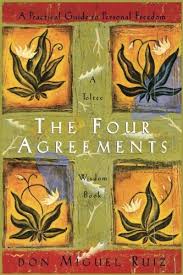Don’t Make Assumptions
byChapter 4: Don’t Make Assumptions, the third agreement in The Four Agreements by don Miguel Ruiz, a principle that addresses the profound impact assumptions can have on our lives. Ruiz explains that making assumptions often leads to misunderstandings, unnecessary conflict, and emotional distress. Many of the problems we face in relationships and life stem from the habit of assuming we know what others are thinking or what they mean by their actions, often without confirming or asking for clarification. These assumptions create a false reality in our minds, leading us to react based on that flawed perception, which can fuel negative emotions and cause us to take things personally. The chapter invites us to reflect on how these assumptions, based on partial truths or misinterpretations, affect the way we view ourselves and others, ultimately contributing to more conflict than understanding.
Ruiz breaks down how the habit of making assumptions creates a cycle of emotional pain and misunderstanding. When we assume something about someone’s actions or intentions, it is easy to jump to conclusions and react without full knowledge, which causes unnecessary distress. This leads to the cycle of taking things personally, which in turn triggers emotional responses like anger, frustration, or sadness. In relationships, especially intimate ones, assumptions can be particularly harmful. Partners may assume they understand each other’s feelings or thoughts without explicitly communicating, which often results in misalignment, hurt feelings, and resentment. These miscommunications accumulate and build up, damaging the relationship over time. The solution Ruiz proposes is a simple yet powerful one: instead of assuming, we should strive for open and honest communication. By asking questions and seeking clarity, we create an environment where misunderstandings can be avoided and emotional well-being preserved.
Beyond relationships, the habit of making assumptions also stems from our natural desire for security and certainty. When faced with uncertainty or when we feel vulnerable, our minds quickly attempt to fill in the blanks with assumptions to provide a sense of control and understanding. This behavior is an attempt to protect ourselves from discomfort, but in doing so, we often distort reality and hurt others in the process. Ruiz suggests that the healthier alternative to assuming is to embrace curiosity and open-mindedness, asking direct questions and allowing room for clarity. By actively engaging in clear communication, we prevent unnecessary emotional turmoil and misunderstandings, fostering healthier and more genuine interactions. Seeking to understand rather than relying on assumptions allows us to navigate life’s complexities with less emotional baggage, making it easier to embrace the present moment without letting fear or anxiety cloud our judgment.
The chapter also highlights how assumptions affect our perception of ourselves and others. When we assume things about our own capabilities or desires, we can either overestimate or underestimate ourselves, leading to self-doubt or inflated expectations. Similarly, when we assume things about others, we impose our own beliefs, fears, or expectations on them, which can lead to disappointment or resentment when they inevitably fall short of these unspoken standards. Ruiz encourages readers to replace assumptions with honesty and transparency, both in how we communicate with others and how we relate to ourselves. By being clear about our needs, desires, and expectations, we prevent ourselves from projecting false assumptions onto others, fostering more authentic and meaningful connections. This shift towards openness helps reduce internal conflict and enables us to see ourselves and others more clearly, without the distortion caused by assumptions.
In conclusion, Don’t Make Assumptions serves as a powerful reminder that assumptions can cloud our judgment, damage relationships, and create unnecessary suffering. Ruiz encourages readers to let go of the habit of assuming and instead embrace a practice of asking questions and engaging in open, honest dialogue. By doing so, we can eliminate misunderstandings, strengthen relationships, and experience greater emotional peace. This agreement offers a path to deeper connection and understanding by removing the barriers of miscommunication and replacing them with the clarity and transparency that comes from asking questions and seeking truth. Through this simple yet profound change in approach, we can transform our lives, reduce conflict, and create stronger, more authentic connections with those around us.


